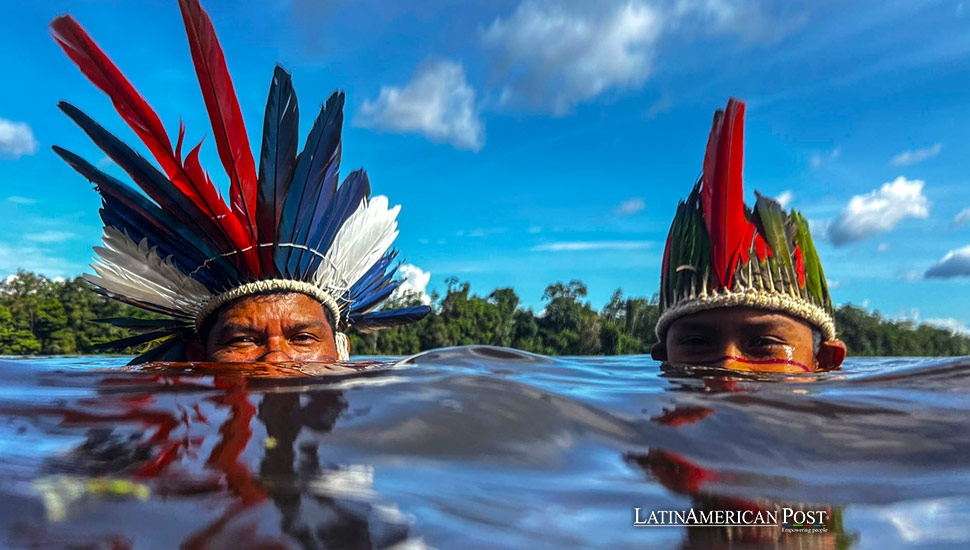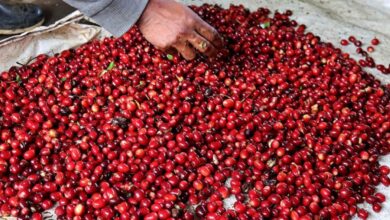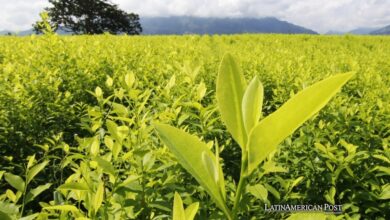Indigenous Mura Fight Gas Extraction in the Amazon Rainforest

The indigenous Mura community is legally challenging gas extraction in Brazil’s Amazon, fearing devastating impacts on their environment and livelihoods, despite government and corporate assurances of development benefits.
The extraction of natural gas in the heart of Brazil’s Amazon has ignited fierce resistance from the Mura people. While authorities tout development benefits for the region, this indigenous group fears for the rivers and forests that sustain their way of life. The Mura have launched a legal battle to halt the project.
Chief Jonas Mura stands just meters from a gas well near their village, listening intently. In the high midday sun, only the sharp call of a toucan breaks the silence. “The forest has a spirit, and this is a disaster. They are drilling on the bones of our ancestors,” says the 45-year-old, dressed in sports pants and a blue and red macaw feather headdress.
The dirt road leading to the well, shaded by towering masarandubas, bears signs every few meters proclaiming, “Protecting nature is everyone’s responsibility.” Yet, the deforested area around the well, with a metal structure and valves barely visible above the ground, spans several football fields.
The well is part of extensive concessions held by the Brazilian company Eneva in the Silves region, about four hours from Manaus, the first gas-producing area in the Amazon basin. Recently, Eneva has doubled down, starting the construction of two gas-fired power plants capable of supplying four million homes, with an investment of 5.8 billion reais (1.1 billion dollars).
Responding to EFE, the company asserts that all its environmental permits are in place and that natural gas helps replace more polluting energy sources like diesel. The projects also enjoy the support of President Luiz Inácio Lula da Silva’s government, which has approved funding of 626 million reais. Despite championing climate change combat, Lula has resisted calls to halt fossil fuel exploitation in the Amazon.
According to official data, Amazonas is currently Brazil’s third-largest natural gas producer, accounting for 9.5% of the national output.
Impact on the Mura Way of Life
In the village of Santo Antonio, Chief Ivanilde dos Santos, 54, recalls a night years ago when she saw a massive flare in the distance while sitting at the communal table. “At first, we were happy. We thought it wouldn’t harm us. Gas would be cheap, we said, but the price has increased,” she explains, sitting at the same wooden table under an inga tree.
Looking at the dark waters of the Anebá River, Dos Santos worries about the impact on fishing, which has dropped by about 50% amid increasingly severe droughts. “The river used to provide a lot of fish, but the water level barely rose this year.”
One of the company’s reports submitted to the regional environmental authority acknowledges the risk of “accidental spills of oils and chemicals.” Adding to the fears is that the indigenous villages should have been consulted beforehand, as international and Brazilian law required. “We were never heard; the company just arrived, deforested, and drilled,” Jonas Mura denounces.
According to Eneva, the nearest indigenous reserve is about 60 kilometers from the future power plants, exempting the company from conducting a consultation. However, the Mura lands are close to the wells that will supply gas to the plants. The federal government confirmed to EFE that there is an ongoing process to demarcate the Mura lands as a reserve, but no date for recognition has been set due to a “shortage” of staff.
Despite the legal limbo, the Prosecutor’s Office has sided with the indigenous people, requesting the project’s suspension due to the lack of prior consultation. In late May, a judge temporarily suspended the permits for some of the wells, but Eneva quickly appealed and overturned the decision.
Environmental and Cultural Concerns
Chief Jonas Mura is undeterred; he travels from the jungle to the city to meet with banks and authorities. He admonishes the former for their investments and the latter for their slow response. “We are the true owners of this land. If they destroy it, where will we go?” he asks.
The Mura people are not alone in their struggle. Indigenous communities across Latin America face similar challenges as they defend their territories against large-scale extractive projects. From the Mapuche in Chile to the Asháninka in Peru, indigenous groups are increasingly vocal about such projects’ environmental and cultural impacts.
The Amazon rainforest, often referred to as the lungs of the planet, plays a crucial role in regulating the global climate. Deforestation and industrial activities threaten its biodiversity and the livelihoods of those who depend on it. Indigenous knowledge and stewardship have been vital in preserving these ecosystems for generations.
Latin America’s history of extractive industries, from mining in the Andes to oil drilling in the Amazon, has often been marked by conflict with local communities. Governments and corporations frequently promise economic benefits and development, but these projects can lead to environmental degradation, social disruption, and violations of indigenous rights.
With its vast natural resources, Brazil has seen numerous clashes over land and resource rights. The country’s indigenous peoples, who make up less than 1% of the population, often find themselves at the frontline of these conflicts. Legal protections for indigenous lands exist, but enforcement needs to be more consistent, and economic pressures can override environmental and social considerations.
President Lula’s administration faces a delicate balancing act. While committed to addressing climate change, Lula must navigate the political and economic realities of a country heavily reliant on its natural resources. His government’s support for the Eneva project highlights the tensions between development and environmental sustainability.
The situation in the Amazon has international ramifications as well. The global community recognizes the Amazon’s importance in combating climate change. International pressure and support are crucial in ensuring sustainable development that respects indigenous rights and protects the environment.
A Call for Sustainable Solutions
The Mura’s legal battle is a microcosm of a larger struggle indigenous communities face worldwide. Their fight for consultation and environmental protection resonates beyond the Amazon, reminding us of the need for inclusive and sustainable approaches to development.
As the world grapples with climate change, the voices of indigenous peoples like the Mura must be heard. Their traditional knowledge and connection to the land are invaluable in crafting solutions that balance human needs with environmental stewardship.
Also read: The Guna’s Struggle Against Climate Change in Panama
The Mura’s resistance against gas extraction is not just about protecting their home; it is about safeguarding the future of the Amazon and its critical role in global ecological health. Their struggle underscores the urgent need for policies prioritizing sustainability and human rights over short-term economic gains.





